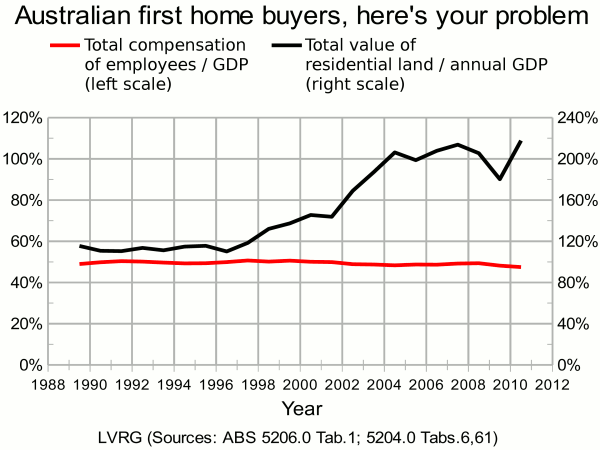How to end the First Home Buyers' Strike without a recession
Property owners face a fork in the road, writes Gavin R. Putland.
The most tax-effective way to spend a spare million, said Julian Disney to Ray Moynihan (Crikey, Apr.1, item 19) is to “buy a much more expensive house than you need” or renovate one “within an inch of its life,” whereas if you don't have a spare million, “the second best option is to borrow and negatively gear. Increasingly houses have become tax shelters, rather than real shelters.”
Renovation is made artificially attractive by high stamp duty and concessional taxation of capital gains. As Joe Boswell put it in his follow-up letter, stamp duty imposes a “crushing fine” of “over half a year's salary” if you trade up, but not if you renovate your current address. And the capital gain following such renovations is tax-free. Meanwhile the negatively-geared investor sacrifices fully-taxed income in favour of concessionally-taxed capital gains.
Renovating your current home does not add to the supply of accommodation. Neither does negative gearing if you simply buy an existing dwelling, as more than 90 percent of negative-gearers do. Negative gearing has no counterpart for an owner-occupant, who gets no deduction for the margin by which the interest cost exceeds the rental value of the home. Hence owner-occupants have trouble competing with investors. And of course first-time buyers have trouble competing with repeat buyers who can cash in untaxed or concessionally-taxed capital gains. As many commentators have warned, the pursuit of such gains has led to a gargantuan bubble. All these causes have converged to price first-time buyers out of the market, as the following graph shows.

Little wonder that Prosper Australia (the author's employer) got so much traction through GetUp! by calling for a “strike” by first home buyers. While part of the intention was to dissuade young people from losing their shirts, the number of people actually influenced by the “strike” call was minimal; most of the “strikers” were already locked out of the market, and knew it.
Even so, as Michael Matusik commented on Moynihan's report, “if house prices crash, unemployment will rise and very sharply”. That's because the fall in collateral values would cause a credit crunch affecting the entire economy.
Can the demands of the “strikers” be reconciled with the need to avoid a price crash? Yes — by broadening the “strike” to include not only first-time buyers but also sellers and repeat buyers, thus turning it into a “stamp-duty strike”.
First-time buyers need prices to fall relative to their spending power. That requirement can be met by a permanent increase in spending power — for example, by abolishing stamp duty as we know it. If the increase in spending power occurs while the market is crashing, it can arrest the crash. If, in addition, the forgone revenue is replaced by taxing (real) capital gains with no grandfathering — for example, through a “vendor stamp duty” imposed by the States — then the reduced attractiveness of capital gains relative to current income will tend to suppress future bubbles. That's what it takes to avoid recession. Very conveniently, that's also what it takes to “break” a stamp-duty strike.
Property owners should warmly welcome such a reform at any time, because
- a tax on (real) capital gains, unlike the present stamp duty, cannot turn a profitable purchase-and-resale into a loss or magnify a loss, and
- if the State gets a “cut” out of uplifts in the value of land, it has the ability and the incentive to invest in infrastructure that causes such uplifts, so that property owners get uplifts that they would not otherwise get.
They should welcome it all the more at the present time, because it's better to pay tax on a capital gain than to make a capital loss. Yes, those are the options.



